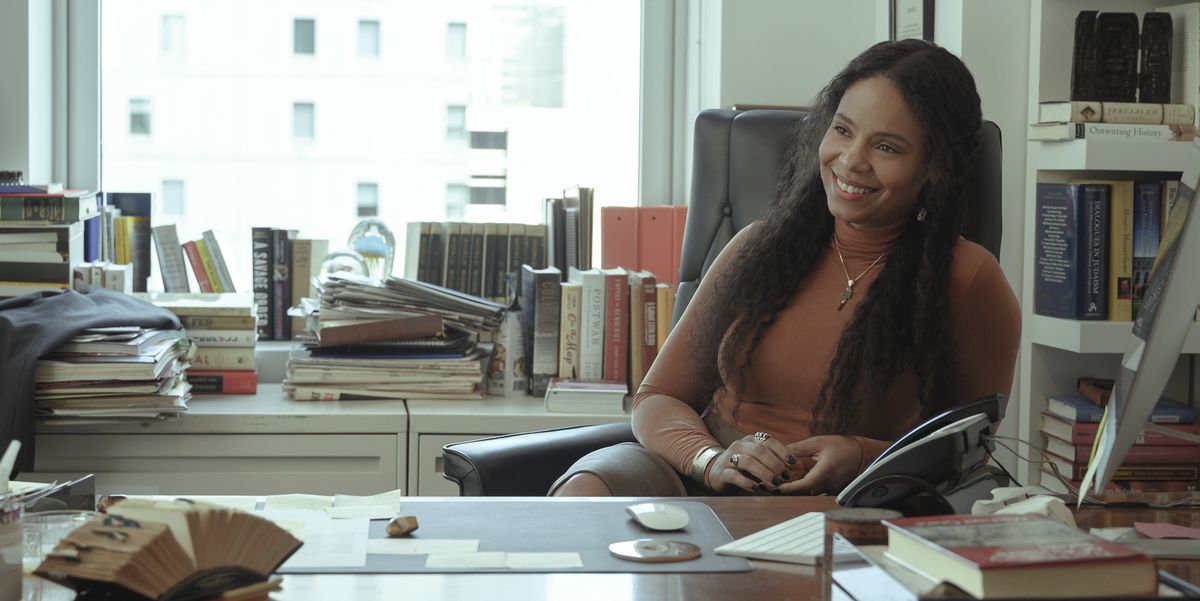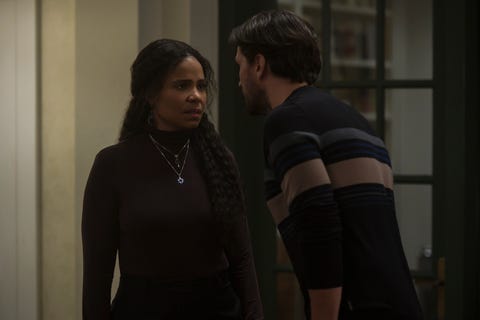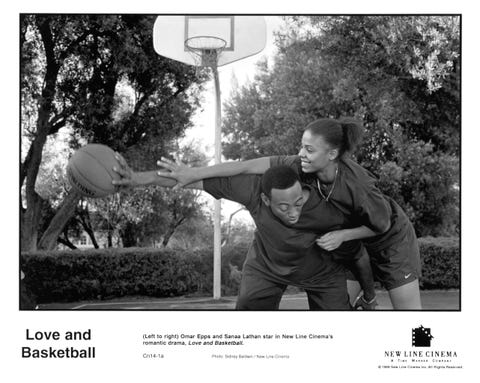The memory is still seared in my mind: Sanaa Lathan, chin up, a basketball clutched to her chest like a lifeline. I was a child sitting in front of the television; Love & Basketball was on BET. Lathan’s Monica Wright was the first Black female I’d ever watched on TV who actually reminded me of myself. Like me, Monica whined when she got her hair combed, hated wearing dresses, and was continually desperate to rush outside and play with the boys. But it was the way Lathan would furrow her brow in determination that stuck with me as I grew. I longed for that fearlessness—both Monica’s and Lathan’s.
Today, Lathan has channeled that fearlessness into a lasting Hollywood legacy. As a leading actress in both beloved films such as Brown Sugar and The Best Man as well as shows like The Affair and In The House, Lathan has built a body of work that brings her (and her fans) immense pride. “It feels great to know that all of the sweat and tears and all of the rejection, all of the times you were on the floor saying, ‘I want to give up,’ that it all was worth it,” she told ELLE. “Thankfully people are touched by [my work] in different ways.”
Most recently, Lathan took on the role of Naomi Hicks, a Black Jewish investigative journalist on Netflix’s drama Hit & Run, which is currently on the streaming service’s Top 10 list. In the gritty mystery, Lathan plays the ex-lover of Segev (Lior Raz), whose wife was killed in a hit-and-run accident. As a reporter for New York Magazine, Hicks uses her connections and forensic skills to solve the mystery of her death.
Next up for Lathan is a role on season 3 of HBO’s acclaimed drama Succession, in which she’ll play attorney Lisa Arthur. The cast and crew are under intense scrutiny not to let any spoilers slide, so Lathan would only reveal that her character is “high-powered” and “fierce.”
But that’s Lathan’s comfort zone; she’s always gravitated toward characters with an edge. And as she approaches her 50th birthday in September, she shows zero desire to slow down. “I feel like I’ll be [working in Hollywood] until I’m like Ruby Dee because it’s what I love to do,” she says. “It’s what makes me happiest when getting out of bed in the morning.”
Ahead, I had the chance to catch up with the legendary actress to discuss her role on Hit & Run and the upcoming season of Succession, her future career plans as a director, and the impact of her legacy.
What grabbed your attention when you first read the Hit & Run script?
Hit & Run, on the page, was so exciting, and that’s rare sometimes. I always know I have a good script when I can read it cover-to-cover without interruptions. They gave me four scripts, and I sat down and read them all in one sitting. I couldn’t wait to meet to find out what happened in the rest of the script.
How did you prepare for the role of Naomi Hicks?
I talked to Yavilah McCoy, a third-generation, African-American Jewish woman who advocates for Jews of color in America. She’s very committed to Judaism, as she is to activism. I also have a cousin who’s a journalist, [so] I talked to her about what drives her to get a story and what does it feel like to go after something non-stop to get to the truth. With the help of the two of them, I was able to make up my Naomi character.
So many actors have said one of their favorite shows is Succession, and if they could act on any set, it’d be Succession. What has your experience been so far working with the cast and crew?
I binge-watched Succession when I got the offer and was blown away by the writing and the acting. It was the same once I got to the set. These actors are just top-notch, and I enjoyed being a part of the cast and working with great writing.
After acting for two decades, you recently announced your directorial debut in Angie Thomas’s On The Come Up adaptation. What is it like going from being an actress to directing a major film?
I see directing as a different way of telling a story. Actors tell the characters’s story. Directors are just a little bit more macro and tell the whole story. It’s just an extension of what I do. I’ve been in the business my whole life and been on sets my whole life. I feel like it’s a natural progression. Actually, when I was a little girl, I used to always say, “I’m going to be a director like my dad when I grow up,” and then acting kind of took me in a different direction. It’s funny how everything comes full circle.
What drew you to direct this film in particular?
Well, I love the book. It’s a beautiful story about a young girl trying to find her authentic voice. She’s a gifted freestyle rapper, and it’s a coming-of-age story. I feel like that little girl is in me and so many little girls worldwide.
Love & Basketball still means so much to people, decades after its release. What does your role as Monica Wright mean to you 21 years later?
Last year, Love & Basketball became a part of the Criterion Collection, which is such a huge honor. I had a two-hour interview before it, and I couldn’t believe that I was talking about 20 years ago because it really doesn’t feel that long ago.
I love that a whole other generation is still enjoying it and getting inspired by her fight and her grit and bravado. I mean, she’s a great role model, right? A lot of people still watch it and are moved by it. That’s all you can ask as an artist.
As the world continues to reboot ‘90s and 2000s classic films and shows, would you consider making a sequel to Love & Basketball?
No, but only because Gina Prince-Bythewood [writer and director of Love & Basketball] would never want to do that. We’ve talked about it. Gina’s response was, “No.” The imaginations of the audience will have to decide what happens to Monica and Quincy.
Being a Hollywood legend in your own right, you had the chance to watch the film industry develop into what it is today. How would you like to see the industry grow into a direction that ensures the needs of upcoming Black filmmakers, producers, actors, and actresses are met?
I’m happy with what’s happening in this last year or so. We are demanding that more films start to look like the world we live in, which is multicultural. Representation truly matters. I know that if you don’t see yourself reflected, it can affect your self-esteem and self-worth. I love that more people of color are in lead roles in films and that more people of color are behind the scenes. Because if we don’t have them behind the scenes, who will want to tell our stories? I would just like that progress to continue so that not only are people of color being represented, but we’re all also getting paid top dollar as any other race. And to keep pushing, keep pushing forward. Keep telling stories that reflect us.
This content is created and maintained by a third party, and imported onto this page to help users provide their email addresses. You may be able to find more information about this and similar content at piano.io


